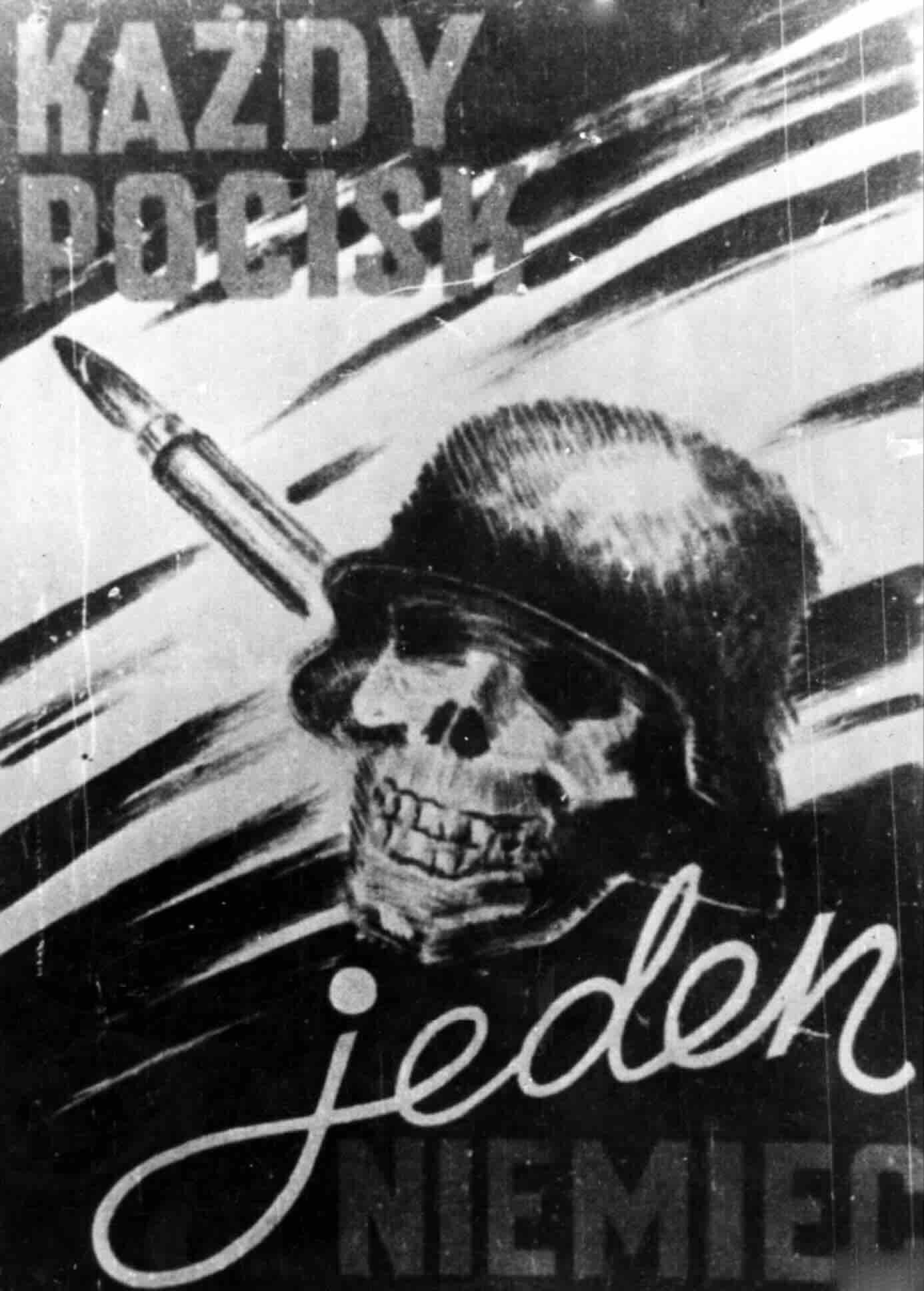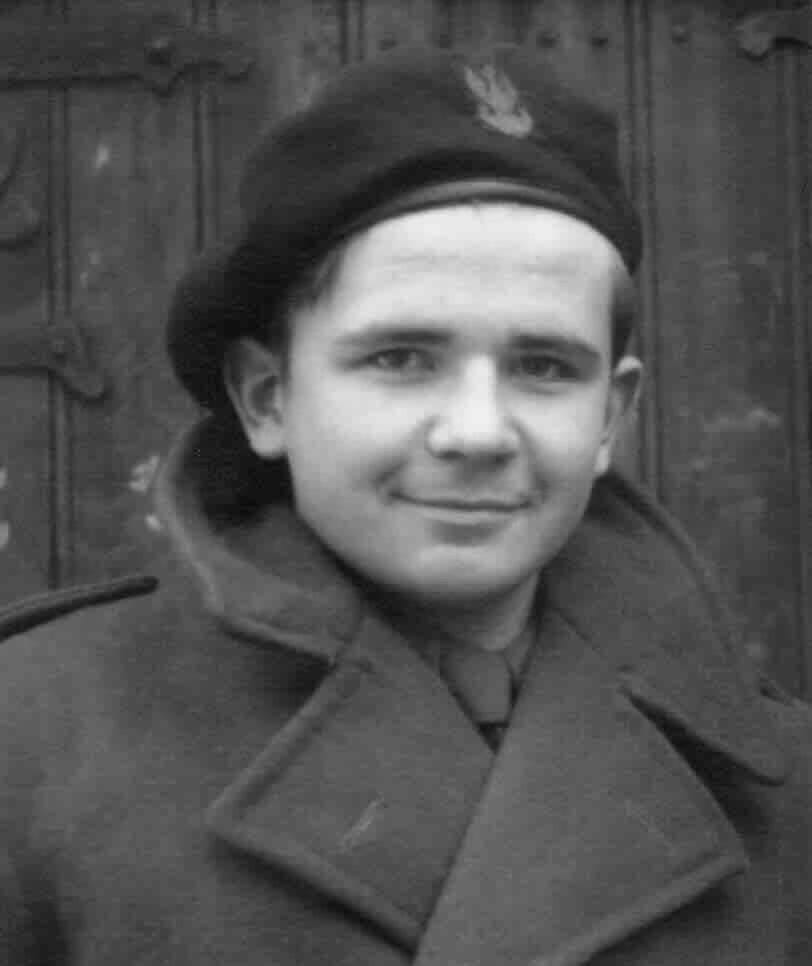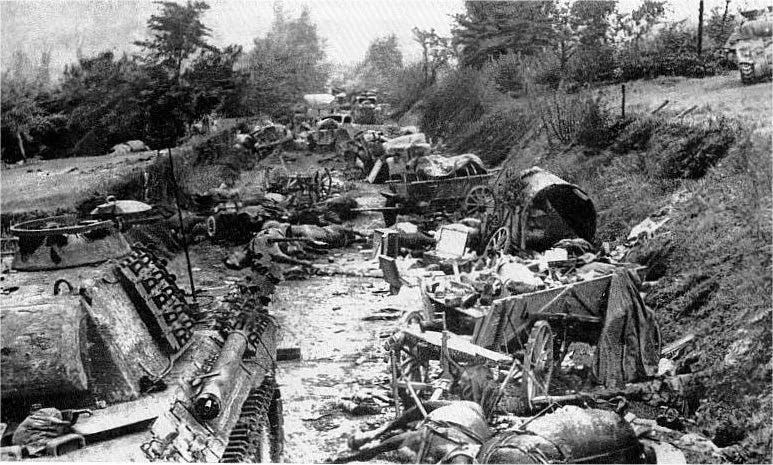'Warsaw 1944'
A young man's vivid account of the fighting taken from 'An Insurgent’s Journal of the Uprising'

Zbignieajkowski's father had died before the war, so the blow when his mother was killed by Germans must have been all the harder. His mother, a doctor, worked closely with the Polish underground. How the Germans knew about her is not known - but they burst into her apartment and shot her down. Zbigniew, in the next room, escaped out of the window and climbed down the drainpipe.

Zbigniew’s new home became the Armia Krajowa, the Polish Home Army. He trained in rural areas of Poland alongside other young men, ready to rise against the German occupiers. The time came at the beginning of August 1944 when not just the Armia Krajowa but the residents of Warsaw rose up in mass against the occupation. Now eighteen, Zbigniew Czajkowski was in the thick of the action.
He was lucky to survive not just the battle - only three of the ten youths in his squad lived - but also his subsequent treatment as a prisoner of the Germans. More remarkably, he was able to keep a personal diary that was to become the basis for Warsaw 1944: An Insurgent’s Journal of the Uprising.

When first published in Poland in 1968, sold ‘under the counter’ during the communist regime, the memoir was an enormous success. This is an authentic and dispassionate account of how people lived, fought and died during this desperate, heroic episode. It is a dramatic story - but the drama comes from the events not from any embellishment from the author:
23 August 1944
I’ve been standing guard at my position in the ghetto since yesterday evening. We occupied this position unexpectedly after repelling a German attack at dusk. There was a ferocious exchange of gunfire and explosions of hand grenades. By the time we got there to help it was all over. We lost one man dead and another wounded. It’s hard to estimate losses on the German side, but there were definitely a few killed, and we captured a Dreiser machine gun.
All of us were called up to reinforce the position overnight. I lie in a hollow with ‘Rebe’ but nothing much happened all night. This morning ‘Rebe’ disappeared, but I’m still here.
The German heavy machine guns are like rabid dogs today. I inadvertently knocked over a few bricks on the outside of my fox- hole, provoking a stream of bullets which went on for several minutes. The upper part of my barricade has been pulverised into a fine powder. Bullets come flying in through the firing hole quite frequently. Fortunately, I don’t need to use it anymore, as I’ve made two new observation slits lower down, which are well hidden. In ‘Sławek’s absence, our light machine gun is being fired by someone from the first platoon. Then a bullet got in the underside of the cooling jacket, so it’s been taken away, back to the armourer.
The Stuka dive bombers also pay us frequent visits. Their latest targets are the buildings on the other side of Bonifraterska Street, not more than 120 metres from us. Bombs coming away from the aircraft and landing in the depths of the building can be seen all too clearly. Chunks of wall and floorboards fly in all directions. Quite a few have landed near us. After one explosion I thought I saw a human body flying through the air, but it might have been an illusion.
I am terribly tired, suffering from lack of food and sleep. Every few minutes I look at my watch, as though I was due to be relieved at some particular time. I try not to think about anything, just look through my tiny opening at the area in front of me or I turn around and look behind me at the ruins around Krasin ́ski Square and beyond into the Old Town, shrouded in thick clouds of smoke.
I hear crunching of boots along the path that runs along the gully between piles of rubble. I’m being relieved. Someone crawls up to my position. It’s ‘Bohun’. He looks very disheartened, nothing like the spirited young man of the few weeks ago, who was constantly urging me to get involved in the action. His face is caked in dust, eyes are red from lack of sleep, a filthy bandage protrudes from under his helmet. I crawl out backwards to give him room.
‘Grenades are in the same place as before. Nothing else has changed but be careful, they’re really hammering us today.’ ‘Right.’
I slide down the rubble. Back in the High Court, our quarters are quiet which means – everybody’s asleep.
‘ ‘‘Baszkir’’, what did you do with that tin of meat we were going to take to the hospital? We might as well eat it ourselves now.’
We open the can with a bayonet, one of the better ones. There used to be lots of them at the beginning, but they’re coming to an end now.
Somebody sticks his head through the window.
‘Two volunteers to bring a casualty from the ghetto!’
‘Baszkir’ gets up. I can’t go with him as I can’t carry heavy weights with my arm yet. After a while, out of interest, I get up to see who’s been wounded this time. ‘Baszkir’ and another lad are coming through the rubble of the palace, carrying someone on a stretcher. Difficult to recognise who it is, as his face is covered in blood. A red and white mess spills out onto the canvas of the stretcher from the back of the head. Suddenly, I notice a lock of curly blonde hair which had not been matted with blood. It’s ‘Bohun’!
I follow the stretcher into the dressing station. Our battalion doctor arrives. He looks at the wound and shakes his head.
‘The bullet entered through the jaw and came out through the back of his head. He won’t live more than fifteen minutes.’ He straightens up and walks over to another casualty. ‘Baszkir’ and I stand beside the stretcher, unable to say a word. ‘Baszkir’ and ‘Bohun’ were best friends.
Suddenly ‘Bohun’ stirs and starts to moan quietly. It’s obvious he’s suffering terribly.
After a while, I burst out, ‘Please, doctor, maybe we can do something? Maybe a dressing ...’
‘I’ve already told you it’s hopeless. He’ll be dead in less than half an hour and we don’t have many dressings.’
He goes back to his work. We sit on either side of the stretcher. The moans of the wounded boy get louder and louder. He starts crying out some incoherent words. A few times I hear my pseudonym. He starts to shout and scream with pain. I can’t look at his head or what’s coming out of it onto the stretcher. I turn away. His cries tear at me until I feel about to pass out. In the end I get up and run out of the hall.
Once behind the doors I start to feel terribly ashamed. How could I abandon a friend like that? How low can you get? I turn to go back, but each time a louder shriek forces me back and I can’t bring myself to return.
After a while the doors open and ‘Baszkir’ comes out. He doesn’t look up. ‘He’s unconscious,’ he mutters. We pace up and down by the doors of the ward. The screams get louder and louder. I can’t stand it any longer and move away from the doors. The sound of his screams follow me right down the corridors, right down into the furthest reaches of the ruins. I go down into the basement. I see ‘Baszkir’ lying in the corner with his face hidden in a pile of old uniforms, sobbing. I escape out into the street. I wander around not knowing or caring where I’m going. A few times I blunder aimlessly into some crossfire. Eventually I return to the court buildings where I find ‘Baszkir’.
‘It’s all over.’
A long moment of silence. Eventually, ‘Baszkir’ stirs. ’We’re the only two left from the whole squad, ‘Deivir’. We have to look after each other.’
It’s true. I finally have to admit to myself our group of ten that knew each other so well, no longer exists. I believe the same thought is going through both our minds: Who’s next? But neither of us says a word.

24 August 1944
Our quarters feel a bit empty now. The gramophone no longer bellows, and the few amateurs who were unenthusiastically cheering themselves up from a 100 litre barrel of wine standing in the corner, were knocked out by a mortar in the palace yesterday. Rucksacks and various pieces of equipment which belonged to the dead and the wounded are scattered everywhere. I’ve just heard that ‘Mors’ was wounded in the ghetto yesterday. And so there’s only four of us left from the entire platoon as ‘Piechocki’ has been sent to headquarters to act as a messenger. We are no longer divided into squads or platoons, and ‘Lot’ is in command of what remains of the third company. There are now just over twenty of us left and that includes the drivers from the motorised group.
In the morning we buried ‘Bohun’ and one other in the courtyard. Shells were landing all around us more than usual. ‘Baszkir’ and I worked up quite a sweat ‘encouraging’ the German prisoners who were digging the grave.
We were just returning back to our quarters down the stairs when something exploded with a loud bang above our heads. In the darkness and smoke that usually follows those explosions, I manage to crawl into a small niche on the staircase. The rubble comes down with a huge crash. I feel my legs being buried under piles of bricks. Fortunately, they’re only falling under their own weight. When the dust clears, I observe we have a new window, two storeys high. Judging by its size, I reckon it must have been a 220mm shell that hit us.
At around 9 o’clock the gunfire around the frontline intensifies. As usual in such cases, there’s an immediate alert. We run towards the palace fastening our belts and webbing as we go. I’m in an awkward situation as, after yesterday’s gunfight in the ghetto and having lent forty bullets to somebody, I now have only two magazines and a handful of loose rounds left. There’s very little chance of me getting any more ammunition, especially not now, just as I’m running into action.
It seems that fortune smiles on the stupid, though. Running through the burnt out ruins of the palace I see two people I have not met before, leaning over a box, dragging shiny belts of Dreiser ammunition out along the floor. There’s not much time, and without a word I crouch down next to them and help dismantle the belts. Soon after, I run out after the rest of the company with my backpack and pockets stuffed full.
The gunfire in the rubble behind the palace is deafening. Just above me our light machine gun is banging away without stopping. ‘Where’s the third company?’ I shout to someone, trying to make myself heard above the noise. He waves his hand towards the High Court building. Good. At least we’re not in the ghetto this time, I think to myself, as I rush down the stairs. The building is very badly damaged, rubble is piled up everywhere. The situation is clear, so I don’t need to ask anyone for instructions. I run up to the second floor, climb over shattered furniture and broken fragments of wall, and soon find myself a firing position overlooking the ghetto.
What I see amazes, and at the same time terrifies me. I see a perfectly executed German infantry advance across the ruins of the ghetto. Like clockwork, they run, fall to the ground, take cover, run again, in the general direction of the St John the Baptist hospital to one side of us. Dust and smoke is everywhere, so thick it occasionally blocks our line of sight.
There’s no time for reflection. I pull back the bolt, load a round into the breach and check my sights. I spot one Nazi leaping up. I see where he’s hidden. Bam! Bam! Bam!
‘You idiot, not too fast,’ I scold myself, ‘or they’ll wipe you out.’
It’s difficult to control myself every time I see something deserving a bullet. I don’t stop until I’ve emptied both my magazines and start loading them again. ‘Slowly, slowly,’ I keep telling myself. ‘Take it easy, or they’ll think you’re a machine-gun nest.’
I didn’t need to wait long. Bullets from a machine gun splatter around the opening from which I’m firing, reminding me how important it is to change positions frequently.
As I crawl around, I realise we are not the only ones doing the shooting. German bullets crash into the walls, ricochets whistle around the room, plaster falls from the ceiling. Long ribbons of smoke from tracer bullets stretch across the sky and disperse quickly.
I find an excellent position in the second row of rooms. From the broken doorway of the outer room and through the hole in the outside of the building, I can fire outwards with little chance of being spotted. I drag up a table and, lying down on top of it, start firing.
The Germans begin to leap closer and closer. They’re already quite near the hospital and also us. Seen from here, the hospital and the barricade to one side appear deserted, all that can be seen is a little spurt of dust each time a bullet hits a wall. The defenders are keeping out of sight, but you can tell their presence by the fact that the German attack has somehow come to a halt. In some places you can even see them hopping back over the rubble. I’ve cleaned my rifle carefully. It’s firing smoothly now with the fresh ammunition. There’s no lack of targets but obviously it’s hard to tell how successful I’ve been.
I change positions. I can smell burning wood. It takes me a while to realise where it’s coming from. The blue smoke rising up in front of me is coming not only from the breech but also from the wooden parts of my rifle. The barrel is now so hot it’s marking the rest of the rifle black!
I cease firing and move once again to another position. The first line of the German attack has stopped advancing for some reason. On the other hand, there’s quite a commotion around the buildings near Muranowska Street. I set my sights on 500 metres and start firing slowly and carefully. I can see the Germans taking their wounded to the rear on stretchers and supporting them. There’s also lots of people running around, either messengers or carrying boxes, probably with ammunition.
Bam! Bam! Bam!
Shit! I’ve been spotted!
A burst of machine-gun fire crashes in right next to me. The ricochets fly to one side. That was a bit of luck. I return to my original position lying on the table.
I see something in the distance moving around in the ghetto. A cloud of dust. I put my rifle to one side, and reach for my binoculars. I see nothing. I clean the lenses . . . There! A tank! I see the turret moving between the piles of rubble. It drives out into the open, now visible in all its splendour. A feeling, not so much fear as a strange emotion, sweeps over me. I see grenadiers huddled beside the tank. I lay down my binoculars and raise my rifle again. The strange feeling brought on by the sight of the tank in the six-fold magnification of the binoculars passes. I check my range. I would have to set my sights on 600 metres. Why bother? There are better targets closer.
© Zbigniew George Czajkowski 2012, 'Warsaw 1944: An Insurgent’s Journal of the Uprising'. Reproduced courtesy of Pen & Sword Publishers Ltd
Affiliate Links
Recently on World War II Today ...
“Gentlemen,” he said, “the hour is grave. The brigade is completely isolated. The enemy is still fighting: his only escape routes are those you see to the right and to the left. There is nobody except us who can stop them: that is what we shall try to do! Surrender is out of the question! As Poles!




